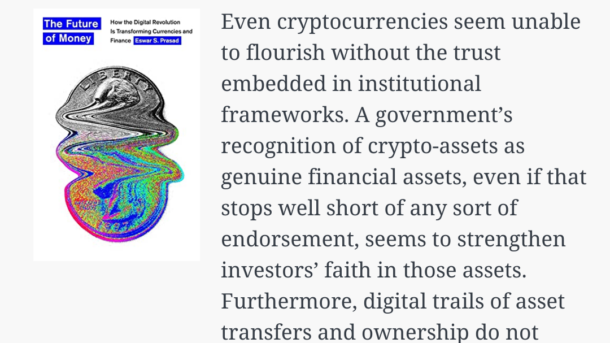Proponents of Bitcoin and other cryptocurrencies of its ilk seem to view its limited supply as the key to its long-term value. This is a thin reed to hang valuation on—especially for a virtual object that has no intrinsic use. Remarkably, and in sharp contrast, money issued by the world’s major central banks seems to have value precisely because its supply is infinitely elastic. More simply, this means that a central bank such as the Fed can print as much of its money as it feels is required to prop up the economy and financial system. Rather than destroying its value, such elasticity in its supply seems to anchor that value. The central bank’s ability to provide such money easily and in massive quantities when the chips are down makes businesses and financial institutions more eager to transact in that money even in normal times, knowing that their counterparts will accept it as well. This is another reason that private currencies, which rely on limited supplies to retain confidence, are unlikely to seriously rival fiat currencies. Another irony is that the origin of cryptocurrencies can be traced to a desire to demonstrate that a trusted authority is not needed to accomplish payment clearing and settlement and also to limit government intrusion into private transactions. Instead, the proliferation of these currencies is goading central banks into issuing digital versions of their own currencies, which might end up putting the privacy of even basic transactions all the more at risk of government surveillance. Even cryptocurrencies seem unable to flourish without the trust embedded in institutional frameworks. A government’s recognition of crypto-assets as genuine financial assets, even if that stops well short of any sort of endorsement, seems to strengthen investors’ faith in those assets. Furthermore, digital trails of asset transfers and ownership do not obviate the need for effective enforcement of contractual and property rights. An enforcement mechanism, which only a government (or some other institution with a real-world footprint backed up by the government’s monopoly on the legitimate use of force) can reliably provide, is particularly important when physical possession of tangible assets is involved. No purely digital mechanism can help the buyer of a car if the seller refuses to turn over physical possession after obtaining payment and handing over the digital keys. In short, decentralized trust mechanisms in commerce and finance cannot entirely displace a trusted government.
I feel like sometimes the conversation around crypto tends to revolve too much around completely subverting the government and inflation. To me, it should never be seen as such a binary thing though. There are still some elements of crypto that can benefit from having a trusted authority, especially in the cases of scams, rugpulls or not delivering of services after payment has been made. There is room for legal authorities to step in and help enforce these actions and prevent bad actors. Further growth in Crypto is also probably highly dependent on government support and approval. However, like the previous passage states, it is probably more likely for us to see governments planning to develop their own form of digital cash.
The general consensus always seems to be that any form of inflation is bad too, which isn’t necessarily the case. One of the biggest selling points of Dogecoin is that it is inflationary, and be virtue of that, be more stable and can be used as a form of digital currency for tipping and stuff. If a currency has to be used for transactions, then extremely high appreciation wouldn’t necessarily be a good thing as it disincentivise people from using it as a form of payment and incentivise holding. That kinda goes against one of the main use cases of cryptocurrencies in the first place, which is being a secure and rapid form of payment.
Overall, honestly, I don’t remember anything too significant from this book, but i think it is a really great book for someone that dosen’t know too much (like me) and wants to get a good cursory overview of the latest developments in the financial world, such as digital banks, payment systems and cryptocurrencies.



